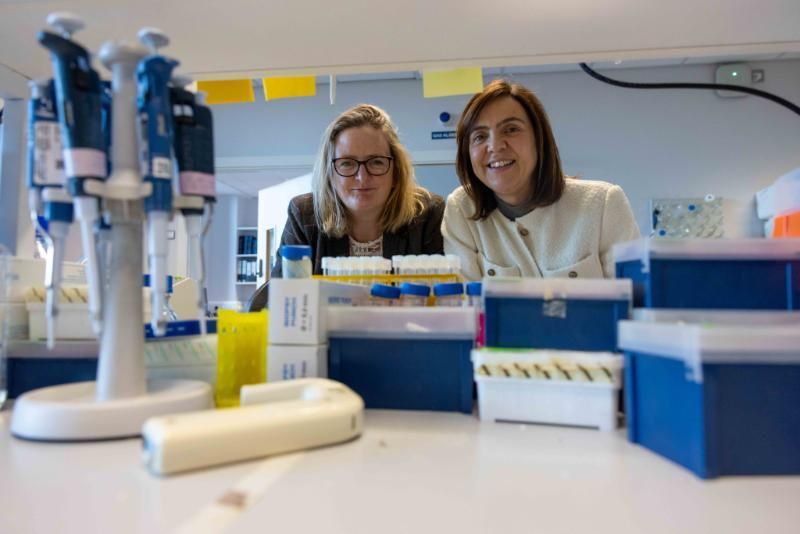This female-led project brings together experts from the Trinity Biomedical Sciences Institute, APC Microbiome Ireland, a world leading SFI Research Centre based at University College Cork (UCC), the University of Exeter, and the University of Bristol. Bloodstream infections are a major cause of illness and death worldwide. The bacterium Staphylococcus aureus is the leading global cause of these fatal bloodstream infections, with antimicrobial resistant strains such as methicillin resistant S. aureus (MRSA) compounding this major clinical problem.
Despite advances in modern medicine the incidences of S. aureus bloodstream infection is increasing year-on-year, and scientists and doctors have no definitive understanding of why this is. Furthermore, these bacteria are present in the microbiome of approximately one third of the human population, and it is well established that those colonised by S. aureus are at higher risk of infection.
Now Prof Ruth Massey, based at the School of Microbiology in UCC and APC Microbiome Ireland, together with Prof Rachel McLoughlin from the School of Biochemistry and Immunology at Trinity College Dublin, Prof Mario Recker at the University of Exeter, and researchers at the University of Bristol will, thanks to this Wellcome Trust funding, examine how this bacteria causes damage to human tissue and evades the immune system.
Utilising its combined cross-disciplinary expertise the project will now build the first detailed description of the key bacteria-host interactions and processes that control the establishment and severity of S. aureus bloodstream infection, with a view to identifying key intervention points to inform treatment guidelines, and ultimately reduce the burden of S. aureus infection for patients and healthcare settings. The project will advance critical understanding of how this notorious human pathogen causes disease.
Battling in the dark
“We are locked in a battle in the dark against S. aureus bloodstream infections, where the bacteria currently have the upper hand, as we do not understand what is going on during the development of the infection,” said Prof Massey, who is a Senior Academic Leadership Initiative Professor at UCC’s School of Microbiology.
“We believe that alongside other patient and bacterial factors, the role of the microbiome, with respect to both the presence of the bacteria with the microbiome, and how the microbiome trains our immune system to respond to infections, will be key to tackling this major global clinical problem. This funding will allow us to shine a light on this poorly understood problem with a view to developing strategies and new therapies to reduce infection rates and patient suffering.”
Prof McLoughlin, Professor in Immunology, is based in the Trinity Biomedical Sciences Institute. She said: “The SNAP trial creates a once-in-a-lifetime opportunity to capture and define the full and varied picture of how this major human pathogen causes disease, and we are very grateful to Wellcome for enabling us to capitalise on this opportunity. This study has the potential to be a game changer for infectious disease research because it represents the first attempt to build a fully integrated model of an infectious disease incorporating the host, the pathogen, and the treatment.
“This project will provide an entirely new understanding of how the notorious pathogen S. aureus causes disease. In doing so it will lead us to identify biomarkers for rapid patient risk stratification in clinical settings and identify new avenues for therapeutic development – ultimately improving patient care and relieving the burden of this disease on a global level.”
Prof Recker, of Exeter University, who will oversee the data analysis and modelling part of the project, added: “The wealth of data generated through this multinational project will provide unprecedented details of the interactions between the bacteria and the human host, which will ultimately help us to predict infection outcomes, and thus guide patient-based treatment options.”
Director of APC Microbiome Ireland Prof Paul Ross said: “This is a very important project made possible by the Wellcome Trust. Staphylococcus aureus infection is a huge global concern and dedicated research like that led by Prof Massey and colleagues is urgently needed to stop the loss of life and suffering of patients the world over.”
Professor Sarah Culloty, Head, College of Science, Engineering and Food Science, UCC, said: “Congratulations to Prof Ruth Massey and colleagues on securing this significant funding for their revolutionary research into the leading global cause of bloodstream infections.”
Prof Sinead Ryan, Dean of Research at Trinity, said: “We at Trinity are delighted that Rachel and her colleagues have secured funding to pursue such an important and timely research project. Incidences of bloodstream infection are increasing each year, but without a clear understanding of why this is there is obviously a gap in scientific knowledge and an unmet clinical need for huge numbers of patients worldwide. We look forward to seeing this project progress and hope it unearths a better understanding of the factors in play, which in turn may help turn the tide against serious infection.”







